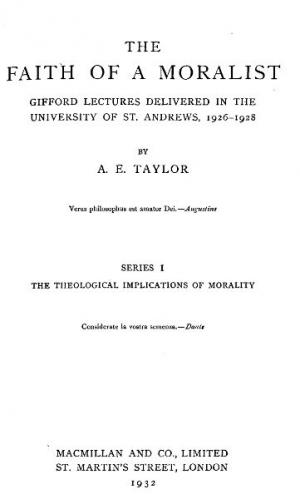In volume one of The Faith of a Moralist, Taylor examines whether ethics is a wholly autonomous science, neither requiring support or a completion from religion nor affording any grounds for religious and theological convictions. Thus, he asks: Does morality involve any presuppositions which point beyond itself? And, if so, are these presuppositions to be found in the sphere of “religion”? If ethics is concerned exclusively with values, and fact and value are ultimately disconnected, there can be no religious or theological implications of morality or ethics. The author links “fact” with temporality and/or history and argues that to be aware of our life as temporal is already to begin to transcend the form of temporality, for all human creation is an attempt to experience the fruition of good in a now where there is no consciousness of the no longer or not yet. If the fruition of all secular goods fails to attain a good in a now where there is no consciousness of the no longer or not yet, Taylor insists that we may reasonably infer that the ultimate good of humankind is non-secular and eternal, and that the facts of our moral being point to the Christian concept of the transformation and completion of nature by “grace”. In relation to a good beyond which no better is attained, life takes on the character of an eternity or abiding now. The strictly ethical life, though, is neither merely successive nor wholly abiding. It is the life of advance from merely animal acquiescence in succession towards the whole and the simultaneous fruition of a complete good. Our own character answers to the good to which we aspire, and the attainment of a fully unified personality depends on finding our principle good in God. According to the author, the implication for morality, then, is twofold: it points to the existence of God as the absolute and final plenitude of good and to an eternal destiny for the moral person whose aim is the good.
For Taylor, if the moral life is one of endeavour towards an eternal good, it is successful insofar as we achieve a communicated eternity. Thus, the goal lies beyond the bounds of the historical, but the advance to it is historical and implies the reality of time, the characteristic form of the historical. In other words, as the author purports, the moral life is a real adventure which begins with “nature” and ends in “supernature”. Progress from and through nature to supernature involves a right combination of “attachment” and “detachment”, and it is this which makes the moral life a difficult adventure. The moral life is further complicated by moral evil and sin.
The author believes that there is inadequacy of the treatment of evil in most works on ethics, though he cites Plato and Kant as exceptions to the rule. In his own discussion of evil, Taylor claims that our experience of personal guilt is sui generis and distinctively human.
According to the author, in moral practice, cleansing the “thoughts of the heart” cannot raise an individual above his or her present moral level. In other words, Taylor argues that the initiative in remaking of personality cannot come simply from within the personality which is to be remade. In this sense, all genuine morality presupposes the supernatural as its environment and nutriment. This does not mean, though, that personality can be remade without genuine personal effort and hard work. But the hour of “vision” in which the inspiration for the work comes is when we look outward, away from ourselves.
The problem of the destiny of the individual person is secondary and dependent; God, not immorality, is the primary interest of ethical religion and theology. The author finds that the problem is whether the moral nature of humankind indicates its destination for a future beyond the grave and, if so, what light it throws on the quality of this future. For Taylor, the question at stake is whether the moral life presents us with functions which demand the “other world” as an environment, i.e., whether the “good” is such that it cannot be obtained “in this life”. If the moral life is marked by the tension between the temporal and the eternal, there must be an element of otherworldliness in practical moral living, and Taylor insists that we have to ask what kind of otherworldliness is morally legitimate. For him, otherworldliness is either the death of all morality or the vital breath of moral life, depending on whether it is the wrong or the right kind.
In the end, according to the author, we only come to a right understanding of “this” world by incorporation of patterns originally felt to belong to the “other” and “unfamiliar”, such as loving rightly and contemplation.



